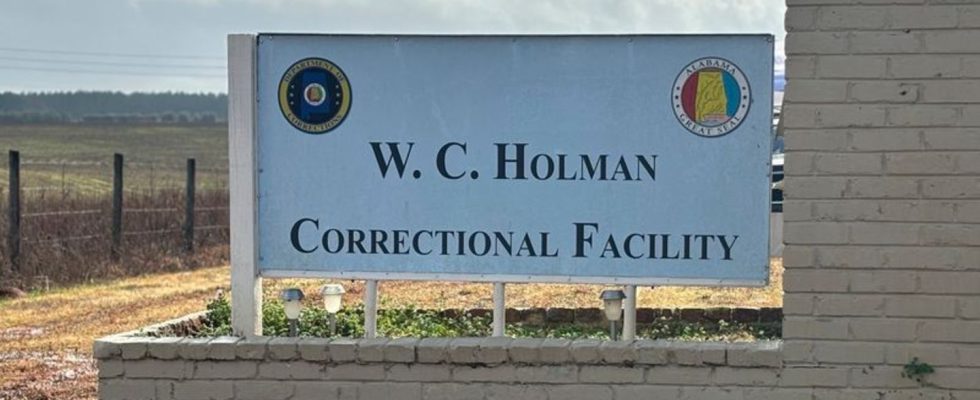Human rights experts warned of a potentially gruesome death for Kenneth Eugene Smith. His lawyers went to the Supreme Court to stop his execution. Unsuccessful.
In the USA, a person sentenced to death has been executed for the first time using a new nitrogen method.
Kenneth Eugene Smith, 58, who was convicted of murder, was executed on Thursday evening in a prison in the US state of Alabama using so-called nitrogen hypoxia, as Alabama’s Attorney General Steve Marshall subsequently announced. The execution method was used for the first time not only in the USA, but worldwide, explained Marshall.
During the procedure, the affected person is supplied with nitrogen via a face mask – the result is death due to lack of oxygen. Human rights experts had previously complained that the method was untested and that Smith could die a gruesome death that could possibly amount to torture. However, all attempts by his lawyers to stop the execution were unsuccessful.
Smith was executed in a prison in the small town of Atmore in the southern US state. According to Marshall, the procedure took less than 30 minutes. Only a few media representatives were allowed to observe the execution, including a reporter from the regional television station WHNT.
According to her, shortly before his death, Smith said: “Tonight, Alabama made humanity take a step back.” And further: “I walk with love, peace and light.” The reporter further reported that when the nitrogen supply started, Smith began to writhe and shake. He breathed heavily for several minutes before he finally stopped breathing.
A law enforcement official said Smith was partially twitching and breathing abnormally. But that was expected and corresponds to the current state of research on nitrogen hypoxia.
Futile rescue attempts
However, United Nations experts believe that it has not been scientifically proven that inhalation of pure nitrogen does not cause serious suffering. They had raised serious concerns, as had various human rights organizations.
Smith’s lawyers had tried until the very end to stop the execution. But neither the relevant courts in Alabama nor the US Supreme Court followed their requests. In recent days, demonstrators had also called on the Governor of Alabama, Kay Ivey, to intervene – but in vain.
Alabama Attorney General Marshall dismissed all of this as pressure campaigns by activists who opposed the death penalty and ignored that the new method was “humane and effective.” “Alabama has accomplished something historic,” he proclaimed. Despite international efforts by activists to undermine the justice system and deny victims of heinous murders the justice they deserve, Alabama’s “best practice” now offers a blueprint for other states.
An act 35 years ago
The history of the Smith case goes back a long way: in 1988, the then 22-year-old committed a contract killing in return for paying $1,000. The victim was the client’s wife, who took her own life a week after the crime. Smith and two accomplices were caught – one received a life sentence, the other was executed by lethal injection in 2010.
Smith admitted in the trial against him that he was present at the crime. However, he insisted that he had not taken part in the fatal attack himself. After an appeal, the jury actually recommended a life sentence for him in 1996, but the judge responsible overruled this at the time. Alabama only abolished the law that allowed this in 2017 – the last US state to do so.
A failed execution attempt before
Smith was actually scheduled to be executed in 2022 – also by lethal injection. However, the prison staff were unable to insert the necessary cannula into his arm. After several hours of lying strapped on the execution table, he was taken back to his cell. After that first execution attempt, Smith was diagnosed with post-traumatic stress disorder.
However, the courts did not consider the failed attempt nor the concerns about the new method to be sufficient to stop the nitrogen execution. Smith’s lawyers failed with various motions in several courts up to the country’s Supreme Court.
The Supreme Court rejected another urgent application at the last minute on Thursday evening. The start of the execution was delayed because those responsible were waiting for this decision. But the last legal rescue attempt by Smith’s lawyers also failed. They had argued that it would become a kind of test candidate and that there were still far too many questions unanswered about the new procedure.
The nightmares in advance
The case has attracted widespread attention across US borders in recent weeks. Smith himself had telephoned from prison to reporters from the British Guardian just a few days before his execution and reported that he was plagued by nightmares about having to return to the execution chamber. “I’m not ready for that,” he said. “No way. I’m just not ready.”
Relatives of the woman who was killed in the 1988 contract killing had reacted with incomprehension to the debate about Smith’s possible suffering. Her son told broadcaster WAAY before the execution: “Some of these people out there are saying he shouldn’t suffer like that.” But his mother also had to suffer. “They just stabbed her – multiple times.”
The death penalty still exists in the military, at the federal level and in 27 states in the USA, although it is de facto no longer carried out in several of these states. The approved methods vary from state to state. By far the most commonly used method today is execution by lethal injection. Nitrogen hypoxia is only permitted in the states of Oklahoma and Mississippi other than Alabama. The method has never been used there before.

